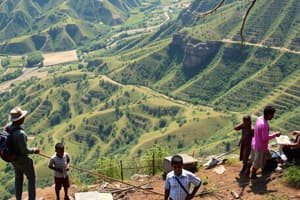Podcast
Questions and Answers
What is the main focus of physical geography?
What is the main focus of physical geography?
- Urban development and planning.
- Natural processes and features. (correct)
- Cultural landscapes.
- The study of human activities.
Which of the following is a sub-discipline of human geography?
Which of the following is a sub-discipline of human geography?
- Biogeography
- Geomorphology
- Climatology
- Urban development (correct)
What does GIS stand for in geographical tools?
What does GIS stand for in geographical tools?
- Generalized Integrated System
- Geospatial Information Software
- Geographic Interaction Statistics
- Geographical Information System (correct)
Which theme of geography refers to the growth of cities?
Which theme of geography refers to the growth of cities?
What does the concept of 'relative location' refer to?
What does the concept of 'relative location' refer to?
Who proposed the theory of continental drift?
Who proposed the theory of continental drift?
Which of the following is NOT a career in geography?
Which of the following is NOT a career in geography?
What does sustainability in geography primarily focus on?
What does sustainability in geography primarily focus on?
Flashcards are hidden until you start studying
Study Notes
Definition
- Geography is the study of the Earth's landscapes, environments, and the relationships between people and their environments.
Branches of Geography
-
Physical Geography
- Focuses on natural processes and features (landforms, climate, ecosystems).
- Includes sub-disciplines like geomorphology, climatology, and biogeography.
-
Human Geography
- Examines human activities and their spatial implications.
- Covers topics like urban development, cultural landscapes, and economic geography.
-
Geographical Techniques
- Tools and methods used in geography, including GIS (Geographic Information Systems), remote sensing, and cartography.
Key Concepts
-
Location
- Absolute Location: Exact coordinates (latitude and longitude).
- Relative Location: Position relative to other places.
-
Place
- Characteristics that define a location (physical and human traits).
-
Human-Environment Interaction
- How humans adapt to and modify the environment.
-
Movement
- The flow of people, goods, and ideas across space.
-
Region
- Areas defined by common features (cultural, political, physical).
Important Themes
-
Globalization
- Increasing interconnectedness of countries through trade, communication, and culture.
-
Sustainability
- Balancing environmental health, economic viability, and social equity.
-
Urbanization
- The growth of cities and the movement of populations from rural to urban areas.
Tools of Geography
-
Maps
- Representations of areas showing spatial relationships.
- Types include physical maps, political maps, thematic maps.
-
GIS
- Technology used for mapping and analyzing spatial data.
-
Remote Sensing
- Obtaining information about the Earth's surface from satellites or aircraft.
Famous Geographers
- Carl Ritter: Contributed to the development of modern geography.
- Alfred Wegener: Proposed the theory of continental drift.
- Jared Diamond: Known for work on environmental history and human geography.
Careers in Geography
- Urban planner
- Environmental consultant
- Cartographer
- GIS specialist
- Teacher or researcher in geography
Contemporary Issues
- Climate change and its impact on geography.
- Urban sprawl and its effects on communities.
- Resource management and sustainability challenges.
Definition of Geography
- Study of Earth's landscapes, environments, and human-environment interactions.
Branches of Geography
- Physical Geography
- Emphasizes natural processes and features such as landforms, climate, and ecosystems.
- Includes sub-disciplines like geomorphology, climatology, and biogeography.
- Human Geography
- Investigates human activities and their spatial effects.
- Covers urban development, cultural landscapes, and economic factors.
- Geographical Techniques
- Encompasses tools and methods like GIS (Geographic Information Systems), remote sensing, and cartography.
Key Concepts
- Location
- Absolute Location: Defined by exact coordinates (latitude and longitude).
- Relative Location: Position in relation to other locations.
- Place
- Unique characteristics of a location, including both physical and human attributes.
- Human-Environment Interaction
- Examines how humans adapt to and change their environments.
- Movement
- Studies the flow of people, goods, and ideas across different spaces.
- Region
- Areas differentiated by common characteristics (cultural, political, or physical).
Important Themes
- Globalization
- Refers to the growing interconnectedness among nations through trade, communication, and cultural exchange.
- Sustainability
- Focuses on maintaining a balance between environmental health, economic viability, and social equity.
- Urbanization
- Describes the expansion of cities and the migration of populations from rural to urban settings.
Tools of Geography
- Maps
- Visual representations that showcase spatial relationships, with types such as physical, political, and thematic maps.
- GIS
- A technology for mapping, analyzing, and interpreting spatial data efficiently.
- Remote Sensing
- Involves gathering information about Earth's surface using satellites or aircraft.
Famous Geographers
- Carl Ritter: Pioneered modern geography with a focus on the interrelationship between people and places.
- Alfred Wegener: Known for introducing the theory of continental drift, which explains the movement of Earth's plates.
- Jared Diamond: Highlighted connections between environmental history and human geography.
Careers in Geography
- Urban planner
- Environmental consultant
- Cartographer
- GIS specialist
- Geography educator or researcher
Contemporary Issues
- Climate change and its geographical implications.
- Urban sprawl and its influence on communities.
- Challenges in resource management and achieving sustainability.
Studying That Suits You
Use AI to generate personalized quizzes and flashcards to suit your learning preferences.




